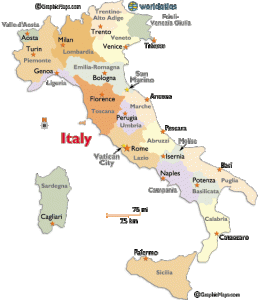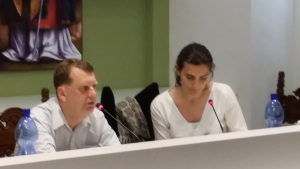
THE CATHOLIC VEGETARIAN SOCIETY’S 5TH NATIONAL CONFERENCE
Alma Massaro is the secretary of the Catholic Vegetarian Society in Italy. Here she reports on their 5th national conference held on 6th June 2015 in Milan to which CCA general secretary, Chris Fegan was invited.
BY ALMA MASSARO – June 2015

The Associazione Cattolici Vegetariani (ACV) held its fifth national meeting in the civic centre of Milan, in Italy, inside the ancient Basilica of Sant’Ambrogio on 6th June 2015. The meeting has been sponsored by the Municipality of Milan, the Archdiocese of Milan and EXPO 2015. The title of the meeting was ‘Non di solo pane vivrà l’uomo ma di ogni parola che esce dalla bocca di Dio – L’alimentazione nel Cristianesimo: la scelta vegetariana’ (‘Not by bread alone does man live, but by every word that proceeds from the mouth of God – Alimentation inside Christianity: the vegetarian choice’).
At the beginning of a warm Italian, almost-summer day, Mons Erminio De Scalzi, Auxiliary Bishop of Milan and Abbott Pastor of the Basilica of Sant’Ambrogio, opened the day introducing the audience to the issues of the meeting. Recalling the Sermon on the Mount, he connected the ‘meekness’ with the wellbeing of the Earth and affirmed: ‘Inside the eyes of the vegetarian there is something of the meek’s gaze’. Recalling the encyclical Rerum novarum, Mons. De Scalzi presented the need for ‘an ethical food chain’ as both a Christian need and a Christian duty and concluded his foreword by mentioning the communitarian dimension of Christianity: ‘Christianity is the most widespread religion on this Planet. With our choices we could make a big difference’.
Food and Spirituality
Mons. Eugenio Binini, Bishop Emeritus of Massa Carrara, was the first speaker of the day. He offered a series of different meanings of food: a gift that God gives to all His/Her creatures; a language, a way to communicate; a sign of God’s love – ‘the God who provides’; relationship, it expresses our need to be loved; and, last but not least, an expression of our way of being in this world.
The second speaker of the day was father Guidalberto Bormolini, priest of the Comunità dei Ricostruttori and PhD candidate at the Pontificio Ateneo Sant’Anselmo. ‘Food discipline’, he said, ‘is crucial inside spiritual ascesis; spiritualization is not a punishment but a sublime pleasure that permits humans to delight in superior pleasure’. Following Church Fathers, father Bormolini explained food ascesis as the first step to move from carnal love to mystic love. In this sense food ascesis is not deprivation or punishment but rather a preparation (from Greek, askesis: the physical preparation of the athletes). He concluded recalling Sant’Ambrogio, who affirmed that ascesis is a crucial way to sustain body wellbeing – a body that, as the Bible says, is ‘the temple of the Holy Spirit’.
After the lunch break, a video from Paolo De Benedetti and a talk from Gianfranco Nicora, respectively, a theologian and a member of the Istituto Italiano di Bioetica, introduced the public to the too-often forgotten meaning of creation. Humans, they said, are viceregent of God, therefore their duty is ‘to dress and to keep it’ and not to act as a tyrant, exploiting animals and nature. The creation in fact is ‘God’s you, that is, His/Her loving project’. In this sense, they concluded, what we eat has a deep religious, but also social, meaning.
The fourth speaker of the day was Mons. Luca Bressan, professor at the Facoltà Teologica dell’Italia Settentrionale and the Episcopal Vicar for Culture, Charity, Mission and Social Action of the Archdiocese of Milan. He concentrated his speech on the educational role of food. Food, he explained, is relationship with God – God feeds us; but it is also relationship with our neighbour every time we help them to answer to their needs. Food therefore is solidarity. In this sense it is possible to understand the importance of the educational role of food, which is not only ascesis, and therefore feast, but also banquet. And the banquet, explained Mons. Bressan, permits a deeper understanding of our relationships with others and with God, a fact that emerges from the Eucharist.
A Common Aim
At the end of the day, the conference closed with the presentation of the Italian Associaizone Cattolici Vegetariani (ACV) and Catholic Concern for Animals (CCA). Dr. Manuela Bastianelli is vice-president of ACV, while Mr Chris Fegan is general secretary of CCA. Through the voices of the speakers there clearly emerged the common aim of these organizations, that is to spread a deeper understanding of Christian love towards all God’s creatures.
The conference closed with the Mass inside the Basilica. It had been a brilliant day, inside the charming environment of Sant’Ambrogio at the very heart of Milan.


Comments are closed.